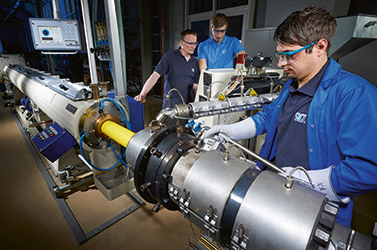Find events


Course Overview
*This course is VAT exempt.

Overview
Polymers are large molecules made up of repeating units called monomers. The process of polymerization involves chemically bonding multiple monomers together to form a polymer. There are three main types of polymerization: radical polymerization, addition polymerization and condensation polymerization.
In free-radical polymerization, monomers with double bonds are linked in a chain reaction by activation with a catalyst. An example for this reaction is the formation of polyethylene. In addition polymerization monomers with two reactive functional groups react with each other. An example is the chemical reaction of isocyanate and polyol to form Polyurethane. In condensation polymerization, again monomers with two reactive functional groups react with each other. But this reaction results in the loss of a small molecule, such as water or alcohol. An example is the formation of nylon-6,6.
Regardless of the type of polymerization, the resulting polymer has a much larger molecular weight than the individual monomers due to the repetition of the monomer units. Polymers can have a variety of physical and chemical properties, depending on the specific monomers and the way they are linked together.
You will have access to this course for 12 weeks from booking.
You will receive a certificate of completion after passing the learning test.
- From Crude Oil to Plastics
- Defintions
- Production of Plastics
- Formation Reactions of Plastics
- Copolymers
- Polymer Blends
- Molar Mass Distribution
- Learning Test



Course Overview
*This course is VAT exempt.

Overview
Polymers are large molecules made up of repeating units called monomers. The process of polymerization involves chemically bonding multiple monomers together to form a polymer. There are three main types of polymerization: radical polymerization, addition polymerization and condensation polymerization.
In free-radical polymerization, monomers with double bonds are linked in a chain reaction by activation with a catalyst. An example for this reaction is the formation of polyethylene. In addition polymerization monomers with two reactive functional groups react with each other. An example is the chemical reaction of isocyanate and polyol to form Polyurethane. In condensation polymerization, again monomers with two reactive functional groups react with each other. But this reaction results in the loss of a small molecule, such as water or alcohol. An example is the formation of nylon-6,6.
Regardless of the type of polymerization, the resulting polymer has a much larger molecular weight than the individual monomers due to the repetition of the monomer units. Polymers can have a variety of physical and chemical properties, depending on the specific monomers and the way they are linked together.
You will have access to this course for 12 weeks from booking.
You will receive a certificate of completion after passing the learning test.
- From Crude Oil to Plastics
- Defintions
- Production of Plastics
- Formation Reactions of Plastics
- Copolymers
- Polymer Blends
- Molar Mass Distribution
- Learning Test



